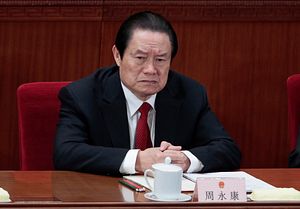After months of speculation, Xinhua announced today that Zhou Yongkang, a former member of China’s all-powerful Politburo Standing Committee (PBSC), has been officially placed under investigation for “serious disciplinary violations.” The brief announcement is at once the fulfillment of analyst predictions and a major breakthrough in Xi Jinping’s anti-corruption campaign.
Zhou, who served as the head of China’s internal security apparatus, is the first former or standing PBSC member to be investigated for corruption. Ever since Xi began his anti-corruption crusade, there have been signs that he had his sights set on Zhou. The Central Commission for Discipline Inspection (CCDI) has steadily targeted known proteges of Zhou’s at each of his former power centers, including officials from the public security sector and from Sichuan province (where Zhou had served as party chief) as well as executives from the China National Petroleum Corporation, where Zhou had been a senior manager. Zhou’s family, including son Zhou Bin, have also been targeted. Zhou himself has reportedly been under house arrest since December 2013, according to Reuters.
Still, there was some speculation that Xi Jinping might be satisfied with “removing the tiger’s teeth”: cutting Zhou off from his political allies and leaving him powerless without actually taking the audacious step of formally investigating a former PBSC member. Such a move could conceivably upset the delicate nature of trust between China’s top leaders by breaking the unwritten rule that Party members of a certain rank have de facto immunity from corruption or criminal charges.
Targeting a former PBSC member is politically risky, but it also has undeniable benefits — it will set Xi’s anti-corruption campaign apart from the similar movements instituted by his predecessors. Targeting Zhou sends a clear signal to the Chinese people that high rank will not prevent prosecution for misdeeds. Xi Jinping promised to go after “tigers” in his anti-corruption campaign, and now he has netted a historically big one.
It’s difficult to get a handle on the scale of Zhou’s alleged corruption. Back in April, a New York Times investigation estimated that Zhou’s family had amassed one billion renminbi ($160 million) in assets in “at least 37 companies scattered across a dozen provinces.” NYT cautioned that this estimate did not include real estate holdings or overseas assets. Reuters reports that Chinese authorities have seized assets worth over $14 billion from Zhou’s family and political allies, hinting at a far greater level of corruption. The South China Morning Post, however, suggests that when charges are filed against Zhou, the amount of money involved will not be astronomical (perhaps to prevent overly scandalizing the public).
It will be some time before Zhou’s case makes its way into China’s court system, if it ever does. Zhou will be investigated first by the intra-Party disciplinary arm, the CCDI, in a process that officially began with Tuesday’s announcement. The CCDI investigation could take several months or even years, although it’s likely that the process will be on the swifter side. The investigation into a high-ranking figure like Zhou would not have been officially announced without extensive preparation. After the CCDI concludes its investigation, it will officially announce the crimes Zhou is charged with (likely embezzlement, bribery, and other forms of financial corruption) and almost certainly strip Zhou of his Party membership.
Only after the Party investigation is complete will Zhou’s case potentially be turned over to the courts. This is not a certainty — it may be decided that stripping Zhou of Party membership is punishment enough — but it is highly likely. In addition to fighting corruption, Xi Jinping has also adopted the mission of strengthening China’s court systems and the rule of law, even though he still envisions a legal system ultimately beholden to the Chinese Communist Party. The trial and conviction of former political star Bo Xilai was widely lauded by Chinese media as an example of the strength of rule of law in China’s courts. It’s likely that Xi will want to use Zhou’s case as another positive (and public) example of the legal system in action.
The official announcement of an investigation into Zhou Yongkang is a political coup for Xi Jinping. It shows that, less than two years after assuming power, Xi has amassed enough political support to take the unprecedented step of charging a former PBSC member. With Zhou in the bag, and Chinese media cautioning that the anti-corruption campaign is far from over, the question is who will be Xi’s next high-profile target — a question Xi’s fellow CCP members are surely asking themselves as well.

































